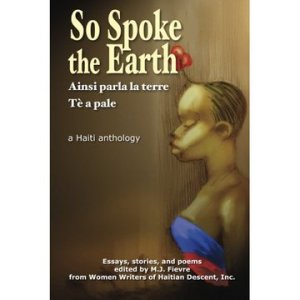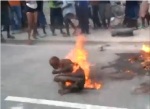ANTHOLOGY PROJECT
Release Date: Summer 2012
So Spoke the Earth: The Haiti I Knew, The Haiti I know, The Haiti I want to Know.
Edited by Women Writers of Haitian Descent, Inc. To be published in the United States in English, French and Creole. Distribution: International via Kindle and Amazon Create Space.
So Spoke the Earth is a multilingual anthology of literature about Haiti that explores its past, present and future as experienced by its diverse inhabitants—both native and non-native—over the past four decades. Presenting each work in its original language, the anthology features the accounts of both Haitian and non-Haitian writers and their attempts to grapple with the impact left on them by their personal experiences with the island-nation. The anthology presents each work in its original language: English, French and Haitian Creole.
Following the January 12, 2010 earthquake, there has been an increased public interest in Haiti’s culture and traditions. This is an important anthology about Haiti in that it is a celebration of Haitian spirit, multiculturalism and diversity.
Through various narratives and poems, the literary legacy and unique history of the island is highlighted in content and style. This collection is unique yet uses successful techniques from preceding anthologies. As in Lillian Castillo-Speed’s anthology Latina: Women’s Voices from the Borderlands, the work includes various genres (fiction, nonfiction, and poetry). Like Edwidge Danticat’s anthology The Butterfly’s Way: Voices from the Haitian Dyaspora in the United States, the book has a thematic structure according to the contributions received.
Following a FOREWORD, the anthology is divided in three sections:
LANMÒ MÒDE TOUPATOU (Death was lurking)
Death and tragedy are the main themes of this section. While some of the pieces offer a vibrant account of life in Haiti and explore the specificities of rituals such as funeral rites, others speak directly to the effects of the January 2010 earthquake. Included are first and third-person accounts of the moments following the tragedy, stories of the search for survivors, and an exploration of the different shapes of grief after the loss (both in Haiti and in the Diaspora). Each of these narratives is presented in English.
TOUT PWASON KA MANJE MOUN (And danger came rushing in)
The expressiveness of the Haitian people is evident in their rich storytelling tradition. The second section of the anthology, written in French and Creole, explores Haitian folklore with modern legends and mysteries.
VERITE DEKWOKE BATON (And the truth shall make you mad)
The third section addresses the topic of Haiti’s economic problems, and the demonstrated effects of the misery that has accompanied it, such as the presence of child slavery and the strained relations between Haiti and the Dominican Republic, where thousands of Haitians have labored in sugar cane fields for generations. This section answers the question “how do Haitians deal with their problems?” The section ends with a piece about the history of Haitian carnival since “kanaval” is probably the only time when the people allow themselves to forget their heartache and raw pain.
ABOUT WWOHD, Inc.
Women Writers of Haitian Descent, Inc. is a literary organization established in 2000 to encourage the development of Haitian women writers and to foster greater public awareness and appreciation of their work through local, national, and international education programs, lectures, and events. The organization’s activities and services include a literary contest, writing workshops, a book club, a writer’s group, readings and various social and literacy-oriented projects. WWOHD also provides forums for Haiti’s literary daughters to connect and for the preservation of their works in a special online collection located at http://www.wwohd.org.
ABOUT THE EDITOR-IN-CHIEF
Born in Port-au-Prince, M.J. Fievre is an expat whose short stories and poems have appeared in numerous publications, including Haiti Noir (Akashic Books), The Southeast Review, The Caribbean Writer and The Mom Egg. She is the editor of Sliver of Stone Magazine, the Secretary of Women Writers of Haitian Descent, and a regular contributor to the online publication, The Nervous Breakdown. Her author website is located at http://www.lominy.com.
***
ANTHOLOGIE:
Ainsi parla la terre (So Spoke the Earth)
Publication: Eté 2012
Le tremblement de terre du 12 janvier 2010 a suscité un intérêt public accru autour de la culture et des traditions d’Haïti. Cette anthologie trilingue tient une place importante puisqu‘elle honore l’esprit du terroir, le multiculturalisme et la diversité de ce pays. Elle explore le passé, le présent et le futur d’Haïti, tels que vécus ou imaginés par ses habitants—Haïtiens comme étrangers—au cours des quatre dernières décennies. Chacun des textes est présenté dans sa langue originale.
A travers divers récits et poèmes, l’héritage littéraire et l’histoire unique de l’île sont mis en lumière. Cette collection, tout en étant sans pareil, utilise des techniques employées avec succès par d’autres éditeurs. Tout comme le florilège de Lillian Castillo-Speed, Latina: Women’s Voices from the Borderlands, notre volume présente divers genres (romanesque, non romanesque, et poésie). Tout comme le recueil de morceaux choisis d’Edwidge Danticat, The Butterfly’s Way: Voices from the Haitian Dyaspora in the United States, le livre a une structure thématique.
Après un AVANT-PROPOS, l’anthologie est divisée en trois parties:
LANMÒ MÒDE TOUPATOU (Death was lurking)
La mort et la tragédie sont les thèmes principaux de cette section. Tandis que certains des morceaux offrent un compte vibrant de la vie en Haïti et explorent les spécificités de certains rituels tels que les rites funèbres, d’autres parlent des effets du tremblement de terre de janvier 2010. Chacun de ces récits est présenté en anglais.
TOUT PWASON KA MANJE MOUN (And danger came rushing in)
L’expressivité des Haïtiens est évidente à travers leur tradition orale. La deuxième partie de l’anthologie, écrite en français et créole, explore le folklore haïtien avec ses légendes et ses mystères.
VERITE DEKWOKE BATON (And the truth shall make you mad)
La troisième section se penche sur les problèmes économiques d’Haïti, et les conséquences de la misère, telle que l’esclavage des enfants et les relations tendues entre Haïti et la République Dominicaine, où des milliers d’Haïtiens de plusieurs générations ont travaillé dans les champs de canne à sucre. Cette partie répond à la question «Comment les Haïtiens affrontent-ils leurs problèmes? » La section se termine avec un historique du carnaval haïtien puisque « kanaval » est probablement la seule occasion d’oublier chagrins et douleur.




Where can i buy another book ?(Ainsi parla la terre)